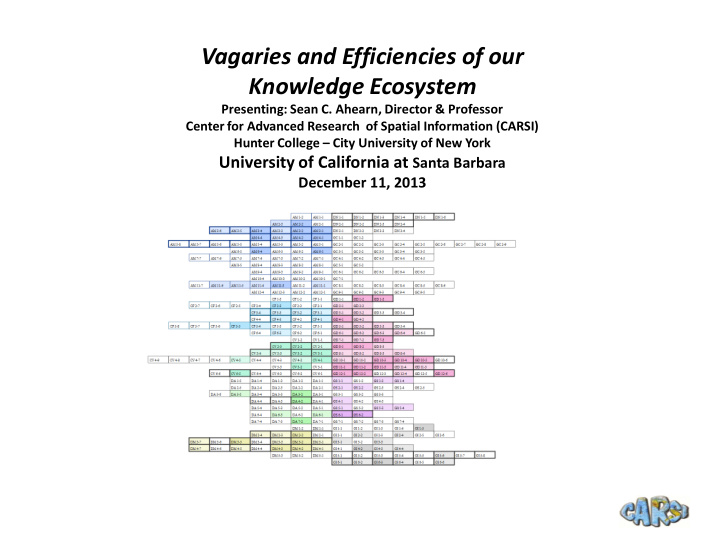



Vagaries and Efficiencies of our Knowledge Ecosystem Presenting: Sean C. Ahearn, Director & Professor Center for Advanced Research of Spatial Information (CARSI) Hunter College – City University of New York University of California at Santa Barbara December 11, 2013
If knowledge is what we do how are we doing?
If our product were a car would it be the ultimate driving machine or a Yugo?
Or would it even drive?
What we do as educator and researchers How current? How efficient? How complete? How relevant? How do we know?
From BoK to Ecosystem Knowledge ecosystem Gao et al., 2006; Ciccarese et al., 2008 BoK DiBiase et al. 2006, ACM/IEEE-CS, 2013 Dynamic, interconnected environment knowledge Ciccarese et al. 2008, Biomedical Discourse Ontology Ahearn, Skupin, Plewe
One “ P lace” ? Educator How does my course compare with other comparable courses? What does this concept mean? How does it intersect with another concept? How best to visualize this concept? Does my course cover this set of concepts? Ahearn, Skupin, Plewe,
Conceptual Model of the Knowledge Ecosystem External Applications Rest Services Visual Wiki BoKOnto VPE • Taxonomy Manag mentne • Instances Content B O KO NTO BoKVis Management • Inferences S ERVER L AYER • Mappings W EB S ERVCIES BoKScorecard SPARQL endpoint Text Mining Interface Course P Course Page age Job Post Job Posting ing Article Article Ahearn, Skupin, Plewe
Visual Wiki http://carto.byu.edu/bokviswiki/bokwiki.html GIS & T BoK2: Ahearn, Skupin, Plewe, DeMer
Update Process flow & Version Access Visual Wiki Data mining A P New Concept P New Concept V1.5b L I C A T Approval Process I O N S New Concept V1.6 Ahearn, Skupin, Plewe
Intro GIS Courses
Advanced GIS Course
Intro vs Advanced GIS Course (KA)
Intro GIS (blue) vs Adv GIS (red) Course
Geographic Information Science & Technology Body of Knowledge – Foundational Research • Ahearn, S., I. Icke, R. Datta, B. Plewe, M. DeMere, A. Skupin . (2013) . “Re - engineering the Geographic Information System Body of Knowledge” Special Issue on GIS-Cyber-Infrastructure. International Journal for Geographic Information Science Vol. 27 Issue 11. • DeMeres, M., A. Klimaszewski-Patterson, R. Richman, S.C. Ahearn, B. Plewe, A. Skupin, (2013) in press . "Toward an Immersive 3D Virtual BoK Exploratorium: A Proof of Concept". Transactions on GI, 2013, 17(3):335-352. • Links – NSF Project: • http://gistbok.org/ – BoK Web Services examples: • http://www.gistbok.org/gistbok/services/gistbok1hierarchy • http://www.gistbok.org/gistbok/services/conceptmap?concept=Data+mining – BoKVis: • https://trac.devzing.com/space/BoKVis/wiki – BoKWiki:
Enabling Spatial-temporal Research Across the Campus A “Smart” Data Laboratory for Collaboration and Sharing Sean C. Ahearn, Professor and Director Taylor Oshan, MA Center for Advanced Research of Spatial Information, Hunter College – CUNY December 10, 2013
Geo-spatial Platform • Goals – Create a “geo - spatial platform” to bridge different research disciplines and the communities in which they operate. Space is the common attribute. – Facilitate the research process by providing a spatially aware smart data system. – Build a network of data repositories which can be utilized for comparative studies. • Context – Sharing data and methods within campuses and across campuses. – Increasing scale of available data: • Neighborhoods Cities Regions
Current Data Ecosystem • Inefficient • Can lack documentation • Often lacks spatial component • Multiple researchers re-format the same data for similar applications • Disconnect between publications, models, and data.
Network Characteristics - Lower Accessibility, Lower Infrastructure Costs - Higher Accessibility, Higher Infrastructure Costs? Goal: Highest accessibility with lowest infrastructure costs
Our Proposal…More Than Just Data • Use ArcGIS online to construct a low cost research eco-system which will: – Eliminate inefficiencies and repetition in the data analysis process. – Promote spatial principles which are sometimes overlooked, though crucial. – Minimize effort necessary to get data “GIS ready”. – Create a larger network of data repository nodes. – Integrate connections between data, methods, and models for sharing research.
Optimal - A Central Yet Distributed Node The platform acts as a central node but also provides the technology to bring the associated accessibility directly to all users. Geography Anthropology Spatial Lab ArcGIS Online Sociology/ Public Health Psychology
Increase Efficiency • Data Suggestions – those who used this data also used… – Additional Scales – New Data sets • Analysis Suggestions – how has this data been used in the past? • Data requests – who else is looking to pursue similar data collection? • Automate - data aggregation/de-aggregations (Privacy)
Dasymetric Maps: “de - aggregating” data More accurately visualize aggregate data by distributing its density to only pertinent space. (ie. Census tract population to buildings)
M.A.U.P. - far different stories… Population Density
Linking Concepts With Ontology • Forge a common language among disciplines working with spatial data • Build on top of ArcGIS “tag” feature to build descriptors. • Customize an existing ontology to more closely model research projects occurring within and between urban environments.
Tagging Content Within ArcGIS Online
Spatial Laboratory Functions • Display base layer – data displayed from tiled web mapping services. • Store and serve domain and project data – local and remote data made available via web service. • Select and query – simple spatial and attribute-based queries that return tabular and geometry results. • Add/edit/delete – web-based tools to create and modify tabular or vector-based user-contributed data. • Pre-defined analysis – commonly-used spatial and non-spatial analysis functions. • Custom analysis – user-contributed modules.
Access Spatial Lab right from ArcMap
Data added directly to ArcMap- no downloading, no fuss
Create Custom Apps
Create Custom Apps Community resource navigator created from data submitted by public health researchers and spatially formatted by geographers.
Spatial Laboratory Long term Neighborhood research and Community engagement http://carsilab.org/spatial_lab/ GIS Services Community Researchers LBW HS-dropout Project layers incarceration Unwanted pregnancy Gathering points Community layers Health foods After school activities Troubled area Domain layers economy socia l cultural education environmental health demographics transportation Base layers 311 buildings ortho-photography parcels
?
Recommend
More recommend